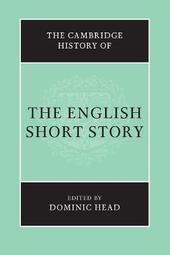
|
The Cambridge History of the English Short Story
Paperback / softback
Main Details
| Title |
The Cambridge History of the English Short Story
|
| Authors and Contributors |
Edited by Dominic Head
|
| Physical Properties |
| Format:Paperback / softback | | Pages:669 | | Dimensions(mm): Height 229,Width 152 |
|
| Category/Genre | Literary studies - fiction, novelists and prose writers |
|---|
| ISBN/Barcode |
9781316618042
|
| Classifications | Dewey:809.31 |
|---|
| Audience | | Professional & Vocational | |
|---|
|
Publishing Details |
| Publisher |
Cambridge University Press
|
| Imprint |
Cambridge University Press
|
| Publication Date |
21 October 2021 |
| Publication Country |
United Kingdom
|
Description
The Cambridge History of the English Short Story is the first comprehensive volume to capture the literary history of the English short story. Charting the origins and generic evolution of the English short story to the present day, and written by international experts in the field, this book covers numerous transnational and historical connections between writers, modes and forms of transmission. Suitable for English literature students and scholars of the English short story generally, it will become a standard work of reference in its field.
Author Biography
Dominic Head is Professor of Modern English Literature at the University of Nottingham, where he served as Head of School from 2007-10. He has written extensively on forms of literature and is author of The Modernist Short Story (Cambridge, 1992) and The Cambridge Introduction to Modern British Fiction, 1950-2000 (Cambridge, 2002), and editor of The Cambridge Guide to Literature in English, 3rd edition (Cambridge, 2006).
Reviews'... the book covers enormous ground - colonial stories, rural stories, queer stories, comic stories - and makes room for obscure writers beside the heavyweights ... with this approach, an expert writes each chapter. Highlights include Heather Ingman on the Irish short story and Roger Luckhurst on weird fiction, that amorphous zone between horror, fantasy and surrealism.' Chris Power, New Statesman
|